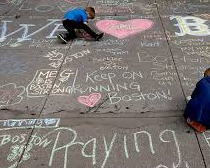Speaking to children about Boston Marathon Bombing

Dear Dr. Darcy:
I have a 9-year old daughter who is asking questions about the Boston marathon bombing and I don’t know how much is appropriate to discuss with her. I’m personally horrified by this. My cousin was in the north tower on 9/11 and the images that we’re seeing on TV are bringing me right back to that day. I can’t believe we live in a world where my child can’t remain innocent of terrorism, at least until high school. What kind of world is it that we’re living in? We can’t go to the movies, to school, or to a marathon without fear of being attacked? How do I explain the world we live in when I don’t understand it myself?
ANSWER
It’s a great question that you ask as I’m sure other parents are struggling with the same issue. To start, you cannot give something that you don’t have, so the first order of business is for us to help you wrap your head around this tragedy. I’m sorry for what you must have experienced on 9/11, and I’m presuming you’ve gotten counseling to help you process it. If you never received counseling, now’s the time to get it.
When you have this conversation with your child, I want to you project a sense of calm, even if you’re not feeling it. You are the parent. She will look to you to decide how to feel about this. And yes, you do need to speak with her about it because she’s already asking questions and you want to be the primary source of this information because you can shape the story and how it affects her.
If she were under the age of 6, I’d suggest you shield her from the story altogether. Children that young don’t need to be burdened with this type of thing. Of course if a child of that age were to begin asking questions, you should answer them, being careful not to answer more than they’re asking. Don’t feel like you need to elaborate.
I always start conversations like this by asking questions. Specifically, ask your daughter what she already knows about what happened at the Boston marathon. Then, ask her if she has any questions about it, and as I said above, be careful to answer only the specific questions that she asks. Finally, it’s imperative that you put it into a hopeful context for her. Explain that this is an isolated tragedy. More importantly, point out to her both in your explanation and by strategizing the news stories that you expose her to, that in EVERY crisis, if she looks carefully, she’ll always see people running towards the problem to offer help. This will fuel her faith that the good people outnumber the bad in the world. And perhaps you should focus more on that yourself, because ultimately, your daughter’s resilience will be more influenced by how you feel about this crisis than by anything else.
Writer’s stats: Female, Straight.